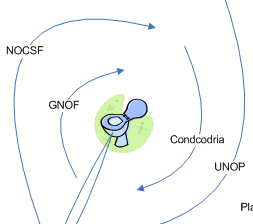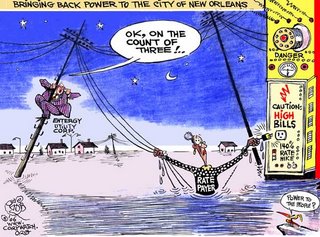
Oddly enough, a couple of days after the Arabella catfish pond was named, the Sewerage & Water Board fixed the fire hydrant which fed the pond. Good job guys!
Listening to Tommy Tucker interviewing New Orleans' new "pothole czar," engineer Robert Mendoza on WWL this morning, I decided to call in to echo a comment made in a previous hour by another caller who complained he hadn't heard anything from Ray Nagin since the election.
Specifically, I wanted to know if "the city" (implying the mayor) has a plan to deal with the water line leaks in a comprehensive way, or if the problems are just getting fixed as they're identified. I strongly suspect that those leaks are one of the reasons why there are so many potholes in the city.
In the ADD style of all WWL hosts, Tucker didn't get the question answered before moving on to another topic.
Last Thursday's Picayune reported that the Sewerage & Water Board identified $447 million in damages caused by flooding after Hurricane Katrina, but S&WB Executive Director Marcia St. Martin expressed her belief that newly-installed monitoring devices could cause that early estimate to rise to over a half billion dollars as new problems are detected. Meanwhile, S&WB members complained that FEMA has still only helped with nine percent of the cost of repairs.
The pencil-thin trickle of water coming out of my tap is a mere annoyance. The more critical issue is whether our homes can be protected, and if businesses can thrive, in a city with where two-thirds of the water pumped is lost before it gets to the tap:
Residents have dealt for months with plummeting water pressure that has compromised fire protection, caused businesses to shut down for hours at a time and forced residents of a lakefront condominium tower this week to choose between footing the bill for their own firefighting detail or having their building shuttered because pressure is too weak to get water to upper floor sprinklers.
Listen Ray Ray: Take credit where credit is due, but damn it, tell us what the hell is going on man!
Under the circumstances, the Sewerage & Water Board is doing a commendable job. And so is the Streets Department. But these departments had big problems
before Hurricane Katrina. I can't remember the number, but I think the estimate for necessary improvements to the aging sewer and water system ran into the billions before Katrina. What happened to that? A lot of the post-Katrina pothole problems were caused by the ground turning to mush underneath the streets after they were inundated, but also by the soil compaction that occurred in the drought of the last several months, corrosion, and uprooted trees. A lot of those new potholes we're seeing are being created by water line leaks gouging out sink holes under the streets.
So what's the plan, man?
And as you move forward, when a street is cut, will you be coordinating with other utilities which need to make repairs or upgrades to ensure that the street only has to be cut once, thus sharing the cost of the street cut, reducing patchwork streets, and inconveniencing residents as little as possible?
I brought this latter issue up when I called Tommy Tucker. I recalled a visit to San Diego years ago. It was one of the first cities to lay down a city-wide high-speed fiber optic network. How? The city integrated all of the maps of the various entities which had infrastructure underneath the streets into one Geographic Information System. Anytime one entity had to cut the street, the city made sure that fiber was laid down, and that other entities were contacted for any repairs or improvements they wanted to make.
Pothole czar Mendoza (who's only been in the job a few months) admitted that the city's GIS infrastructure is as yet incomplete and underutilized, but said that in the next week or two, the city will be trying out a brand-new permitting process to make sure that different entities are alerted when street repairs are being done.
Your answer at last week's
Broadmoor meeting that helicopters and tanker fire trucks can handle fire emergencies, Ray Ray, wasn't satisfactory, as was inadequate your simple restatement of the water line problem.
It was nice to see you come out of hiding, but we need answers, not token public appearances, and
big parties with fireworks to celebrate the anniversary of your pathetic leadership during and after Hurricane Katrina. Blame the feds man -- I'm fine with that! But you have to take some of the blame yourself.
We're all
waiting for some direction, Ray Ray. Most of us don't have the ability to read people's minds. Maybe we should see if the fortune tellers in Jackson Square can figure out what you're thinking.
Related:
Ray in New Orleans -- FEMA drowns city in its own juices, then burns corpse
Sunday morning music:
Imogen Cooper playing Robert Schumann's "Kreisleriana" and Thomas Ades, "Traced Overhead," to the sound of thunder and torrential rain.
Tags:
Hurricane Katrina |
Katrina |
New Orleans |
Louisiana |
We Are Not OK |
America's Wetland |
Ray Nagin |
Nagin |
Rebuild New Orleans



















